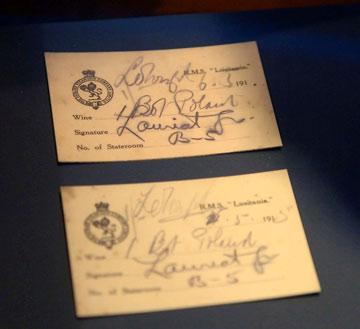Bill Please


Image courtesy Liverpool Daily Post & Echo
I once forgot to pay my bill when covering a big news story in Derbyshire – quite unintentional, of course.
It was at Glossop and the pub landlady came running out calling to me and waving the chit. I put it on my expenses later. In this story all those involved were happy to stay alive, never mind any unpaid bills.
The wealthy American businessman was savouring his time on the luxury liner, relaxing and sampling the varied menus
Charles Lauriat signed two bills for mineral water expecting to settle when he disembarked at Liverpool.
After dinner on 6 May 1915 40-year-old Charles went to a party with fellow American passengers and senior crew members. Life was good. He was on a business trip for the Boston booksellers Charles E Lauriat owned by his father.
Charles had one slight worry during the voyage – the threat of German submarines. America was neutral but the Germans had warned that British ships were legitimate targets.
He had been told the Lusitania would be escorted through the war zone but none materialised. During the voyage he was concerned because the Lusitania seemed to be travelling comparatively slowly.
Charles also noticed that a number of portholes were kept open and that passengers were given a lifeboat drill. He nervously kept a note of how many miles they covered daily.
On the morning of 7 May he noted that the ship was travelling slowly with the Irish coast in view. As he ate lunch he felt a cool breeze through the open portholes.
Shortly afterwards he was talking to two fellow passengers when they felt a muffled impact and the ship trembled. Smoke and cinders shot up on the starboard side – Lusitania had been torpedoed.
Charles helped people put on their lifejackets and get into lifeboats. Chaotic scenes ensued as people realised the ship was about to go under. Charles thought the open portholes were causing the ship to flood more rapidly.
Lusitania went down in 18 minutes with the loss of 1,200 lives. Charles leapt into the sea and managed to get into a collapsible boat. They rowed to safety at the Old Head of Kinsale lighthouse.
We know of Charles’ experiences because he wrote a fascinating book called The Lusitania’s Last Voyage.
He never paid for his mineral water. The two bills (pictured) can be seen in the Merseyside Maritime Museum’s Titanic, Lusitania and the Forgotten Empress gallery.
They bear Charles’ signature and the number of his stateroom, B5. They also carry the names of head waiter Sydney Le Touzel and bedroom steward Robert Morse – Liverpool men who also survived.
A new Maritime Tale by Stephen Guy appears every Saturday in the Liverpool Echo. A paperback – Mersey Maritime Tales (£3.99) – is available from the museum, newsagents and bookshops.
